《高级英语》课程PPT教学课件(第六册)Unit 8 Being There Anatole Broyard
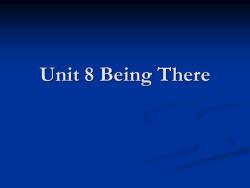
Unit 8 Being There
Unit 8 Being There

I.Teaching Aims: 1.To get students know the style of narrative writing. 2.To have students hold a discussion about their own travel experience. 3.To get students grasp the key words and sentence structures
I. Teaching Aims: ◼ 1. To get students know the style of narrative writing. ◼ 2. To have students hold a discussion about their own travel experience. ◼ 3. To get students grasp the key words and sentence structures
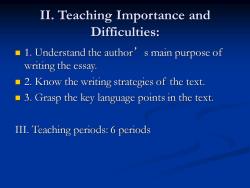
II.Teaching Importance and Difficulties: 1.Understand the author's main purpose of writing the essay. 2.Know the writing strategies of the text. 3.Grasp the key language points in the text. III.Teaching periods:6 periods
II. Teaching Importance and Difficulties: ◼ 1. Understand the author’s main purpose of writing the essay. ◼ 2. Know the writing strategies of the text. ◼ 3. Grasp the key language points in the text. III. Teaching periods: 6 periods

IV.Teaching steps: Warm-up Questions 1)What do you particularly want to see when you travel in other countries? 2)Share some of your exciting travel experience with the class. 3)What are the primary motivations for travelers and what is the unique approach held by some travelers today?
IV. Teaching steps: Warm-up Questions ◼ 1) What do you particularly want to see when you travel in other countries? ◼ 2) Share some of your exciting travel experience with the class. ◼ 3) What are the primary motivations for travelers and what is the unique approach held by some travelers today?

Detailed Study of Paragraph 1 Language Work ■6 adltery:one is always tempted to be unfaithful to one's own country. ■6 e.g:(1)Many people in public life have committed adultery. (2)He had an adulerous relationship with his wife's best friend
Detailed Study of Paragraph 1 Language Work ◼ adultery: one is always tempted to be unfaithful to one's own country. ◼ e.g.: (1) Many people in public life have committed adultery. ◼ (2) He had an adulterous relationship with his wife's best friend
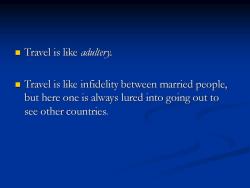
Travel is like adultery. Travel is like infidelity between married people, but here one is always lured into going out to see other countries
◼ Travel is like adultery. ◼ Travel is like infidelity between married people, but here one is always lured into going out to see other countries
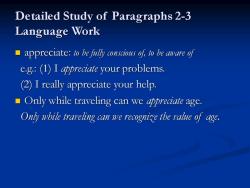
Detailed Study of Paragraphs 2-3 Language Work appreciate:to be filly conscious of,to be aware of eg:(1)I appreciate your problems. (2)I really appreciate your help. Only while traveling can we appreciate age. Only while traveling can we recognize the vale of age
Detailed Study of Paragraphs 2-3 Language Work ◼ appreciate: to be fully conscious of, to be aware of e.g.: (1) I appreciate your problems. (2) I really appreciate your help. ◼ Only while traveling can we appreciate age. Only while traveling can we recognize the value of age

■put aside: e.g,:(1)Can we pat that question aside for now,and come back to it later? (2)Let's put our disagreements aside and make a fresh start
◼ put aside: e.g.: (1) Can we put that question aside for now, and come back to it later? (2) Let's put our disagreements aside and make a fresh start
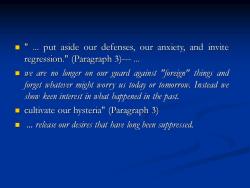
put aside our defenses,our anxiety,and invite regression."(Paragraph 3)- ■ve aren0 longer on our guard against "foreign"things and forget whatever might worry us today or tomorrow.Instead we show keen interest in what happened in the past. ■ cultivate our hysteria"(Paragraph 3) .release our desires that have long been suppressed
◼ " . put aside our defenses, our anxiety, and invite regression." (Paragraph 3)- . ◼ we are no longer on our guard against "foreign" things and forget whatever might worry us today or tomorrow. Instead we show keen interest in what happened in the past. ◼ cultivate our hysteria" (Paragraph 3) ◼ . release our desires that have long been suppressed
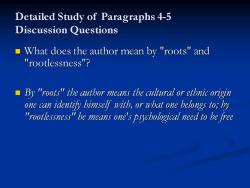
Detailed Study of Paragraphs 4-5 Discussion Questions What does the author mean by "roots"and "rootlessness"? By "roots"the author means the cultural or ethnic origin one can identify bimself with,or what one belongs to;by "rootlessness"he means one's psychological need to be free
Detailed Study of Paragraphs 4-5 Discussion Questions ◼ What does the author mean by "roots" and "rootlessness"? ◼ By "roots" the author means the cultural or ethnic origin one can identify himself with, or what one belongs to; by "rootlessness" he means one's psychological need to be free
按次数下载不扣除下载券;
注册用户24小时内重复下载只扣除一次;
顺序:VIP每日次数-->可用次数-->下载券;
- 《高级英语》课程PPT教学课件(第六册)Unit 3 Bards of the Internet By Phillip Elmer-Dewitt.ppt
- 《高级英语》课程PPT教学课件(第六册)Unit 1 Technology in Reverse Robert J. Samuelson.ppt
- 《高级英语》课程PPT教学课件(第六册)Unit 6 Matriculation Fixation Joe Queenan.ppt
- 《高级英语》课程PPT教学课件(第五册)UNIT10 Love and Resentment Barbara Bick.ppt
- 《高级英语》课程PPT教学课件(第五册)UNIT 8 The Art of Smart Guessing Bryan W. Mattimore.ppt
- 《高级英语》课程PPT教学课件(第五册)UNIT 7 How America Lives James A. Michener.ppt
- 《高级英语》课程PPT教学课件(第五册)UNIT 3 A Hanging George Orwell.ppt
- 《高级英语》课程PPT教学课件(第五册)UNIT 9 Pigskin English Robert MacNeil.ppt
- 《高级英语》课程PPT教学课件(第五册)UNIT 6 Give me Liberty or Give me Death Patrick Henry.ppt
- 《高级英语》课程PPT教学课件(第五册)UNIT 5 Force of Nature Barbara Goldsmith.ppt
- 《高级英语》课程PPT教学课件(第五册)UNIT 4 The Girl in the Fifth Row Leo Buscaglia.ppt
- 《高级英语》课程PPT教学课件(第五册)UNIT 2 The Struggle to Be an All-American Girl Elizabeth Wong.ppt
- 《高级英语》课程PPT教学课件(第五册)UNIT 1 The Fourth of July.ppt
- 《高级英语》课程教学资源(试卷习题)第六册 Unit 10 习题(答案).docx
- 《高级英语》课程教学资源(试卷习题)第六册 Unit 9 习题(答案).docx
- 《高级英语》课程教学资源(试卷习题)第六册 Unit 8 习题(答案).doc
- 《高级英语》课程教学资源(试卷习题)第六册 Unit 7 习题(答案).doc
- 《高级英语》课程教学资源(试卷习题)第六册 Unit 6 习题(答案).doc
- 《高级英语》课程教学资源(试卷习题)第六册 Unit 5 习题(答案).doc
- 《高级英语》课程教学资源(试卷习题)第六册 Unit 4 习题(答案).doc
- 《高级英语》课程PPT教学课件(第六册)Unit 2 A Class Act Florence Cartlidge.ppt
- 《高级英语》课程PPT教学课件(第六册)Unit 4 Disney World - Cities of Simulation as Postmodern Utopias Ken Sanes.ppt
- 《高级英语》课程PPT教学课件(第六册)Unit 5 What Are Our Real Values? By Nicols Fox.ppt
- 《高级英语》课程PPT教学课件(第六册)Unit 7 A Few Kind Words for Superstition Robertson Davies.ppt
- 《高级英语》课程PPT教学课件(第六册)Unit 9 I’d Rather Be Black Than Female Shirley Chisholm.ppt
- 《高级英语》课程PPT教学课件(第六册)Unit 10 Two Truths to Live By Alexander M. Schindler.ppt
- 《英语翻译》课程教学资源(翻译教程)庄绎传——翻译漫谈.doc
- 《英语翻译》课程教学资源(翻译教程)许渊冲——翻译的艺术(PDF电子版).pdf
- 《英语翻译》课程教学资源(翻译教程)汉英法律翻译教程.doc
- 《英语翻译》课程教学资源(翻译教程)南华大学汉英翻译教程(PPT讲稿).ppt
- 《英语翻译》课程教学资源(翻译教程)上外老师翻译教程(共三十六课).pdf
- 《英语翻译》课程教学资源(翻译教程)商务英语翻译教程 College Business English A Course for Translation.pdf
- 《英语翻译》课程教学资源(翻译教程)实用翻译教程 A Practical Coursebook on Translation.pdf
- 《英语翻译》课程教学资源(翻译教程)复旦大学着名教授英译汉翻译讲义.doc
- 《英语翻译》课程教学资源(翻译教程)孟庆升新编英汉翻译教程.doc
- 《英语翻译》课程教学资源(翻译教程)英译汉教程教学指导书(学生用).doc
- 《英语翻译》课程教学资源(翻译教程)厦门大学外文学院英语系《汉英翻译》讲义 Chinese-English Translation.pdf
- 《英语翻译》课程教学资源(翻译教程)张培基——英汉翻译教程 A Course in English-Chinese Translation.doc
- 《英语翻译》课程教学资源(翻译教程)简明英语口译教程 A CURRENT CONCISE PRACTICAL COURSE OF INTERPRETATION.pdf
- 《英语翻译》课程教学资源(翻译教程)商务英语翻译电子讲义.docx
